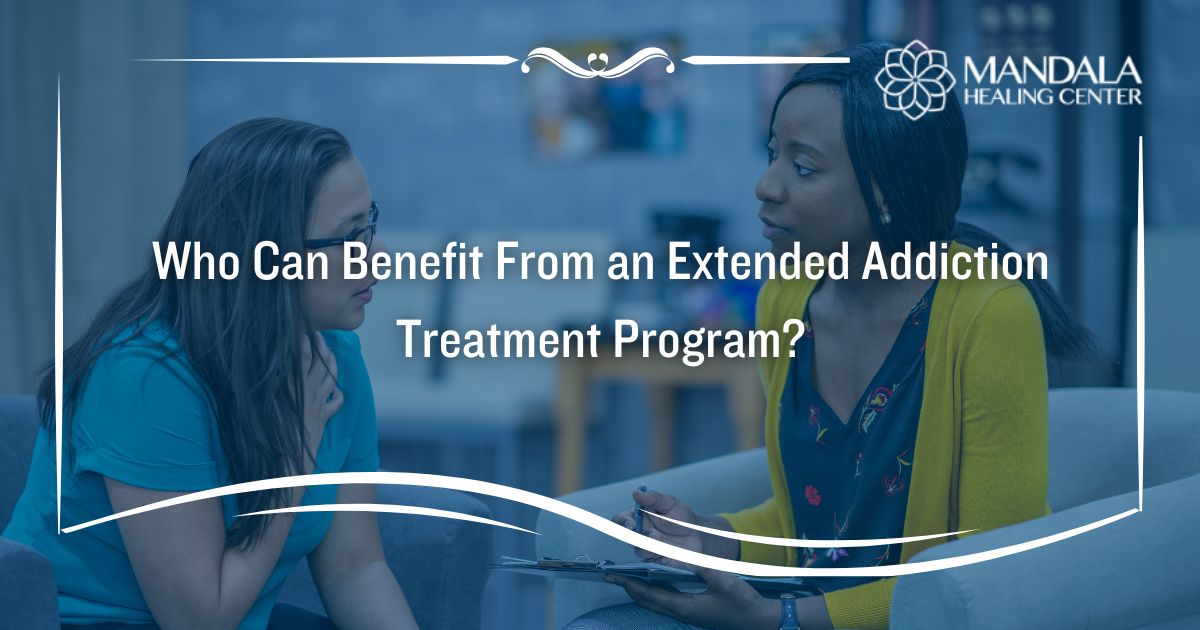Addiction is a chronic and progressive disease that affects millions of Americans each year. According to the Substance Abuse and Mental Health Services Administration (SAMHSA), 48.7 million people struggled with addiction in 2022.[1] In other words, if you are dealing with substance abuse issues, you are not alone.
Substance use disorders must be treated by a professional rehab center that offers medical detox, evidence-based therapies, and relapse prevention planning. The National Institute on Drug Abuse (NIDA) reports that “participation for less than 90 days is of limited effectiveness.”[2] This means that you need at least 90 days within a drug and alcohol rehab program to recover.
While many treatment plans only offer 30 to 60 days, there are long-term rehab programs you can attend. Also known as extended addiction treatment centers, these facilities offer you the time you need to gain tools and skills that will lead to long-term recovery.
That said, long-term rehab might not be for everyone. If you need to continue working while attending treatment, you might want to look for an outpatient treatment facility or a short-term rehab center. Keeping this in mind, people with co-occurring mental health issues, a history of relapse, or severe substance use disorders should consider extended-care drug rehab.
In this article, you will learn:
- What is extended addiction treatment?
- What are the benefits of extended-care drug rehab?
- Who is extended addiction treatment suited for?
What is Extended-Care Drug Rehab?
Extended-care drug rehab is also known as long-term rehab. Instead of only giving you 30 to 60 days to recover from addiction, you receive 90 days or more inside of a treatment facility. Because detox can sometimes take a couple of weeks, long-term rehab is often necessary to have enough time to develop the coping skills you need to prevent relapse.
Extended addiction treatment programs offer services like medical detox, individual therapy, group counseling, dual diagnosis services, relapse prevention planning, aftercare, and more. While you might be worried about the cost of a long-term rehab program, many of them accept a wide range of health insurance plans to make treatment affordable.
What are the Benefits of Extended Substance Abuse Treatment?
If you are assessing your treatment options, you might wonder whether long-term rehab is worth the time commitment.
The benefits of extended-care drug rehab include:
- Separation from Triggers – The first 90 days of recovery can be tough. You will be dealing with cravings for drugs and alcohol that can be difficult to overcome. If you were to be outside of a treatment facility, you might experience triggers that lead you to relapse. Being in a long-term treatment program will separate you from outside triggers when it matters the most.
- In-Depth Therapy – Because you have 90 days or more in an extended-care program, you will have plenty of time to immerse yourself in therapy. If you have a history of trauma that needs unpacking or simply want to identify the root causes of your addiction, you will have the time you need to allow therapy to work.
- Dual Diagnosis Services – Many people struggle with co-occurring mental illnesses. When you have a mental health condition and an addiction at the same time, you need treatment for both illnesses simultaneously. Because extended-care rehab offers ample time for recovery practices, it’s easy to kill two birds with one stone.
- Developing Healthy Coping Skills – Before you leave a treatment program, you want to feel confident in the coping skills you’ve developed. By the time you finish an extended addiction treatment center, you’ll have learned a variety of coping skills that you can use to avoid experiencing a relapse.
- Creating a Community of Support – Because you spend so much time in an extended-care facility, you will create a community of support with your peers. You and your new friends will complete treatment at similar times, giving you comrades to navigate life after rehab. This means you can attend your new support groups with people you already have connections with.
Who is Extended Addiction Treatment Suited For?
If you are wondering who long-term rehab was created for, you’ve come to the right place. Anyone can benefit from extra time in an addiction treatment center, but some people need it more than others.
If you identify with the following, you probably need to consider a long-term drug rehab program:
- You meet the criteria for a moderate to severe substance use disorder
- You have attended addiction treatment before and experienced a relapse
- Lesser forms of addiction treatment like outpatient rehab have not been effective in the past
- You have a co-occurring mental health condition that requires treatment
- You do not have a supportive or stable housing situation to live in during rehab
- Your withdrawal symptoms are severe and require long-term detox services that will take time away from therapy and other rehab services
Get Connected to an Extended Addiction Treatment Program
If you or a loved one suffers from alcohol or drug addiction, it’s time to seek professional help. While extended addiction treatment is not for everyone, it could provide you with the tools and support you need to achieve long-term recovery.
At the Mandala Healing Center, we offer extended-care drug rehab to those who need it. Contact us today for more information on how to get started.
References:
- The Substance Abuse and Mental Health Services Administration (SAMHSA): HHS, SAMHSA Release 2022 National Survey on Drug Use and Health Data
- The National Institute on Drug Abuse (NIDA): Principles of Drug Addiction Treatment












